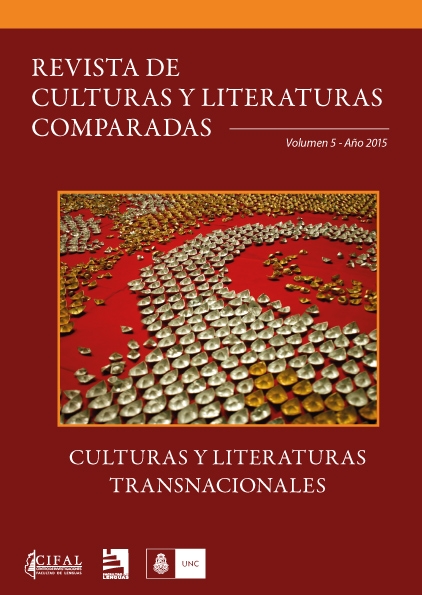11-S: The Overflows of The New Global Empire
Keywords:
globalization local vs global affairs, cracks, tensionAbstract
Undoubtedly, 9/11 represents a moment of inflection in the history of the United States. With the exception of the invasion of the air space back in time in faraway Pearl Harbour, the United States had never been the object of attacks in its territory. 9/11 placed the American nation in an unprecedented position of vulnerability and aroused justified painful reactions, as much as vehement protests in the face of what was considered a completely unjustified attack. “The barbarian invasions” demanded a profound revision of the global order. In this work I propose to analyze the tension between the global relations and the local reality, and the ways in which the apparent homogeneity of globalization cracks when the “empire”—made up of the territories formerly colonized—counterattacks in global times. The corpus for the analysis consists of the following novels: The Falling Man by Don DeLillo (2007), Saturday by Ian McEwan (2005) and A Disorder Peculiar to the Country by Ken Kalfus (2006).Downloads
References
Appadurai, Arjun. “Disjuncture and Difference.” Literature and Globalization. Eds. Liam Connell y Nick Marsh. London y New York: Routledge. 28-36.
Connell, Liam y Nick Marsh (eds.) Literature and Globalization. Eds. Liam Connell y Nick Marsh. London y New York: Routledge.
Costa Picazo, Rolando. “De la globalización, el multiculturalismo y otros enfoques actuales.” América desde la contemporaneidad: Note(s) y Sur(es). Eds. Cristina Elgue-Martini y Mirian Carballo. Córdoba: Comunicarte, 2001. 13-26.
DeLillo, Don. Falling Man. New York, London, Toronto, Sydney: 2007.
---. El Hombre del Salto.Tr. Ramón Buenaventura. Buenos Aires: Seix Barral, 2008.
Elgue-Martini, Cristina y Mirian Carballo (eds.). América desde la contemporaneidad: Norte(s) y Sur(es).Córdoba: Comunicarte, 2001. Impreso.
Giddens, Anthony. “The Globalizing of Modernity”. The Global Transformation Reader. An Introduction to the Globalization Debate . Eds. David Held & Anthony McGrew. 2 ed. Cambridge: Polity Press, 2003. 60-66.
Grüner, Eduardo. El fin de las pequeñas historias. De los Estudios Culturales al retorno imposible de lo trágico . Buenos Aires, Barcelona, México: Paidós, 2005.
Hauerwas, Stanley y Frank Lentricchia, eds. Dissent from Homeland. Essays after September 11. Durham: Duke University Press, 2003.
Held, David & Anthony McGrew (eds.) Globalization/Anti-Globalization, Beyond the Great Divide. 2da ed. Cambridge: Polity Press, 2007.
---. (eds.) The Global Transformations Reader. An Introduction to the Globalization Debate . 2da ed. Cambridge: Polity Press, 2003.
Jameson, Fredric. Postmodernism, or, the Cultural Logic of Late Capitalism. Durham,NC: Duke University Press; London: Verso, 1991.
Kalfus, Ken. Un Trastorno Propio de Este País. Tr. Vicente Campos. Barcelona: Tusquets editores, 2008.
McEwan, Ian. Sábado. Tr. Jaime Zulaika. Barcelona: Anagrama,2005.
---. Saturday. NY: anchor Books, 2005.
Robertson, Roland. “The Universalism-Particularism Issue.” Literature and Globalization. Eds. Liam Connell y Nick Marsh. London y New York: Routledge. 22-27.
Quijano, Aníbal e Immanuel Wallerstein. “Americanity as a Concept or the Americas in the World-System.” International Social Science Journal. 44:4, Nov (1992). 549-556.
Wallerstein, Immanuel. “The Modern World-System: Capitalist Agriculture and the Origins of the European World-Economy in the Sixteenth Century”. New York: Academic Press, 1976. 229-233. Web. 20 oct. 2009.
Published
How to Cite
Issue
Section
License
Aquellos/as autores/as que tengan publicaciones con esta revista, aceptan los términos siguientes:
a) Los/as autores/as conservarán sus derechos de autor y garantizarán a la revista el derecho de primera publicación de su obra, el cual estará simultáneamente sujeto a la Licencia de reconocimiento de Creative Commons.
b) La cesión de derechos no exclusivos implica que la publicación de los artículos en la presente revista no quita la posibilidad o el derecho al autor/a de publicar su obra de manera posterior en otras revistas u órganos editoriales y la autorización por parte de los/as autores/as para que el trabajo sea depositado en los repositorios institucionales, tales como el Portal de Revistas de la Universidad Nacional de Córdoba.



